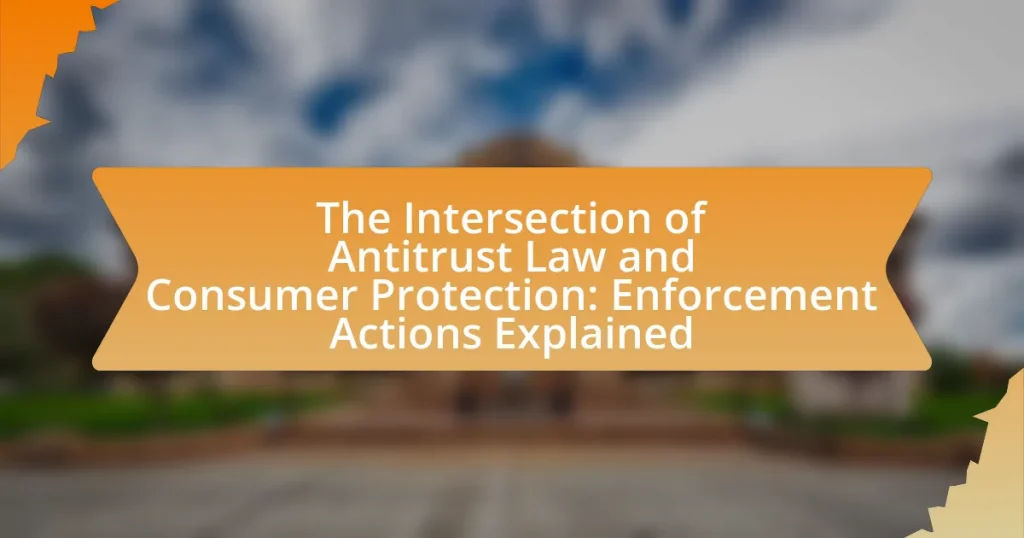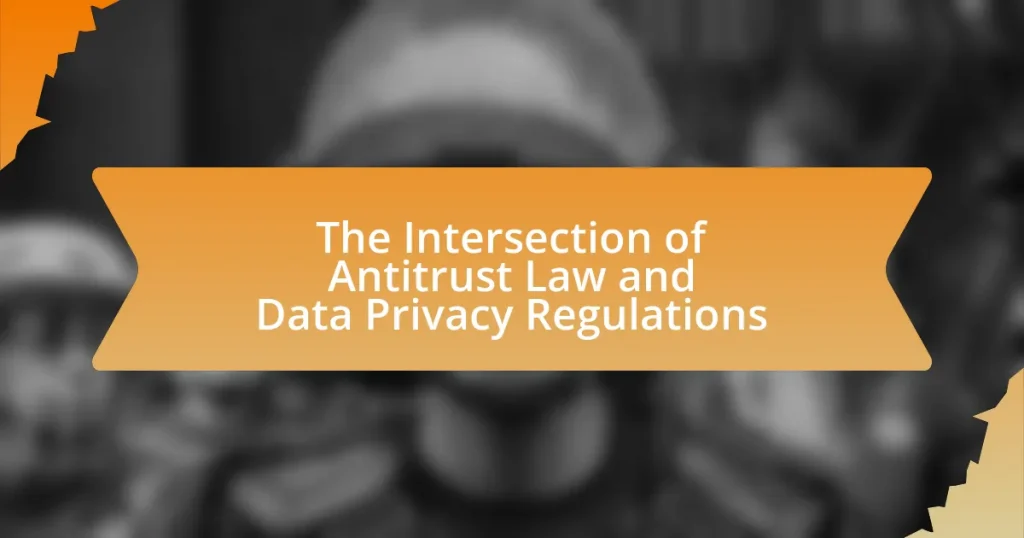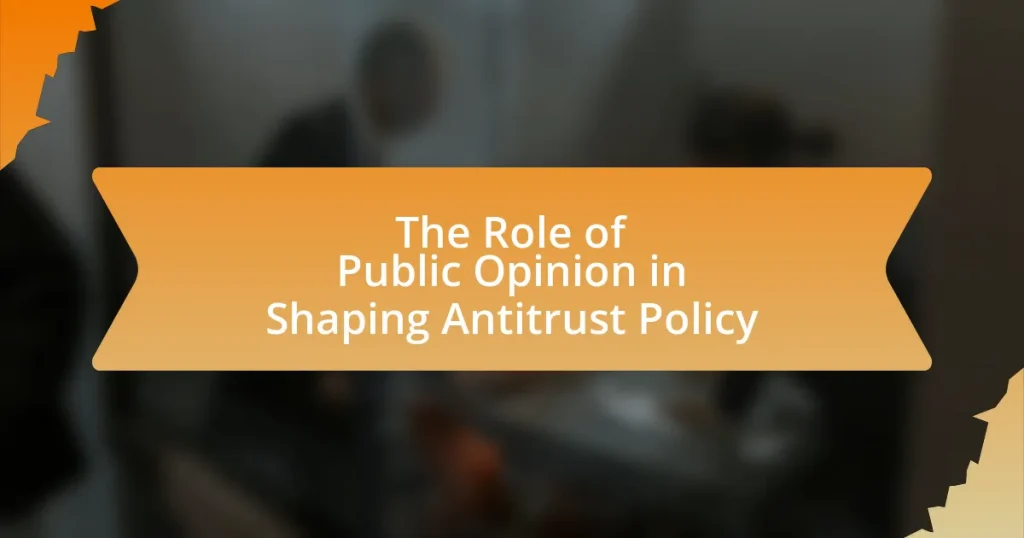The article examines the intersection of antitrust law and consumer protection, highlighting their shared objective of promoting fair competition and safeguarding consumer interests. It outlines the differences between antitrust laws, which focus on preventing monopolistic practices, and consumer protection laws, which aim to shield consumers from unfair trade practices. Key enforcement actions taken by regulatory bodies, such as the Federal Trade Commission and the Department of Justice, are discussed, emphasizing their role in maintaining market integrity and protecting consumer rights. The article also addresses the impact of these laws on consumers and businesses, the consequences of neglecting this intersection, and the importance of consumer participation in the enforcement process.
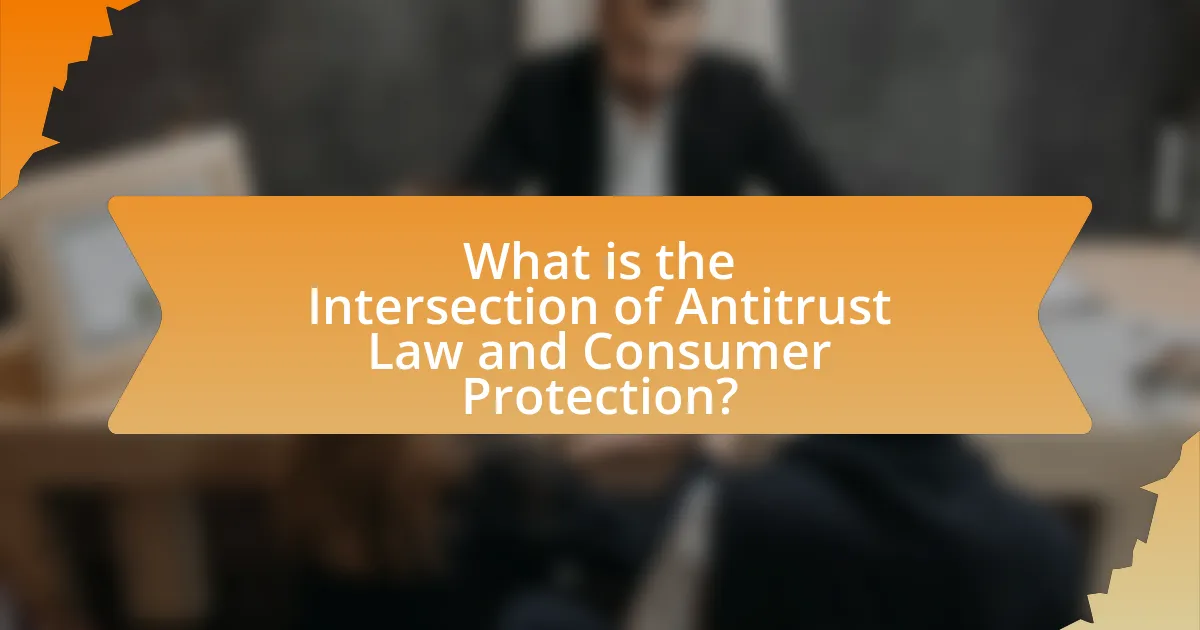
What is the Intersection of Antitrust Law and Consumer Protection?
The intersection of antitrust law and consumer protection lies in their shared goal of promoting fair competition and safeguarding consumer interests. Antitrust law aims to prevent monopolistic practices and promote competition, which inherently benefits consumers by ensuring lower prices, better quality, and more choices. Consumer protection laws, on the other hand, focus on preventing deceptive practices and ensuring that consumers are treated fairly in the marketplace. For example, when companies engage in anti-competitive behavior, such as price-fixing or market manipulation, it can lead to higher prices and reduced options for consumers, thus violating both antitrust and consumer protection principles. This overlap is evident in enforcement actions where regulatory bodies, such as the Federal Trade Commission, address practices that harm both competition and consumer welfare, reinforcing the importance of both legal frameworks in maintaining a healthy market environment.
How do Antitrust Laws and Consumer Protection Laws differ?
Antitrust laws and consumer protection laws differ primarily in their focus and objectives. Antitrust laws aim to promote competition and prevent monopolistic practices that harm market dynamics, while consumer protection laws are designed to safeguard consumers from unfair, deceptive, or fraudulent practices in the marketplace. For instance, the Sherman Act, a key antitrust law, prohibits monopolies and attempts to restrain trade, ensuring a competitive environment. In contrast, the Federal Trade Commission Act enforces consumer protection by prohibiting unfair or deceptive acts affecting commerce. Thus, while both sets of laws aim to enhance market integrity, antitrust laws concentrate on competition, whereas consumer protection laws prioritize consumer rights and safety.
What are the primary goals of Antitrust Laws?
The primary goals of antitrust laws are to promote competition and prevent monopolistic practices. These laws aim to protect consumers by ensuring fair pricing, product quality, and innovation. For instance, the Sherman Act of 1890 prohibits contracts, combinations, or conspiracies that restrain trade, while the Clayton Act of 1914 addresses specific practices that could lead to anti-competitive behavior, such as price discrimination and exclusive dealings. By enforcing these laws, regulatory bodies like the Federal Trade Commission work to maintain a competitive marketplace, which ultimately benefits consumers through lower prices and improved services.
What are the main objectives of Consumer Protection Laws?
The main objectives of Consumer Protection Laws are to safeguard consumers from unfair trade practices, ensure the right to information, and promote fair competition. These laws aim to prevent deceptive advertising, protect against fraud, and establish standards for product safety. For instance, the Federal Trade Commission (FTC) enforces regulations that prohibit misleading advertisements, thereby ensuring that consumers receive truthful information about products and services. Additionally, Consumer Protection Laws empower consumers to seek redress for grievances, enhancing their ability to make informed choices in the marketplace.
Why is the intersection of these two areas important?
The intersection of antitrust law and consumer protection is important because it ensures fair competition while safeguarding consumer interests. This intersection helps prevent monopolistic practices that can lead to higher prices and reduced choices for consumers. For instance, the Federal Trade Commission (FTC) enforces both antitrust laws and consumer protection regulations, which allows it to address practices that harm consumers, such as deceptive advertising or anti-competitive mergers. By integrating these two areas, regulatory bodies can create a more equitable marketplace that promotes innovation and protects consumers from exploitation.
How do these laws impact consumers and businesses?
Antitrust laws and consumer protection laws significantly impact consumers and businesses by promoting fair competition and preventing monopolistic practices. These laws ensure that consumers benefit from lower prices, improved quality, and greater choices in the marketplace, as businesses are compelled to compete effectively. For instance, the Federal Trade Commission reported that enforcement actions against anti-competitive practices can lead to billions in consumer savings annually. Additionally, businesses are encouraged to innovate and improve their services to maintain market share, fostering a healthier economic environment.
What are the potential consequences of ignoring this intersection?
Ignoring the intersection of antitrust law and consumer protection can lead to significant negative consequences, including reduced competition, increased prices, and diminished consumer welfare. When antitrust violations are overlooked, monopolistic practices can thrive, resulting in fewer choices for consumers and potentially harmful market conditions. For instance, a study by the Federal Trade Commission indicates that lack of enforcement in antitrust matters can lead to a 10-20% increase in prices for consumers, as dominant firms exploit their market power without fear of repercussions. Additionally, ignoring this intersection can undermine trust in the market system, as consumers may feel exploited and powerless, leading to decreased overall economic activity.
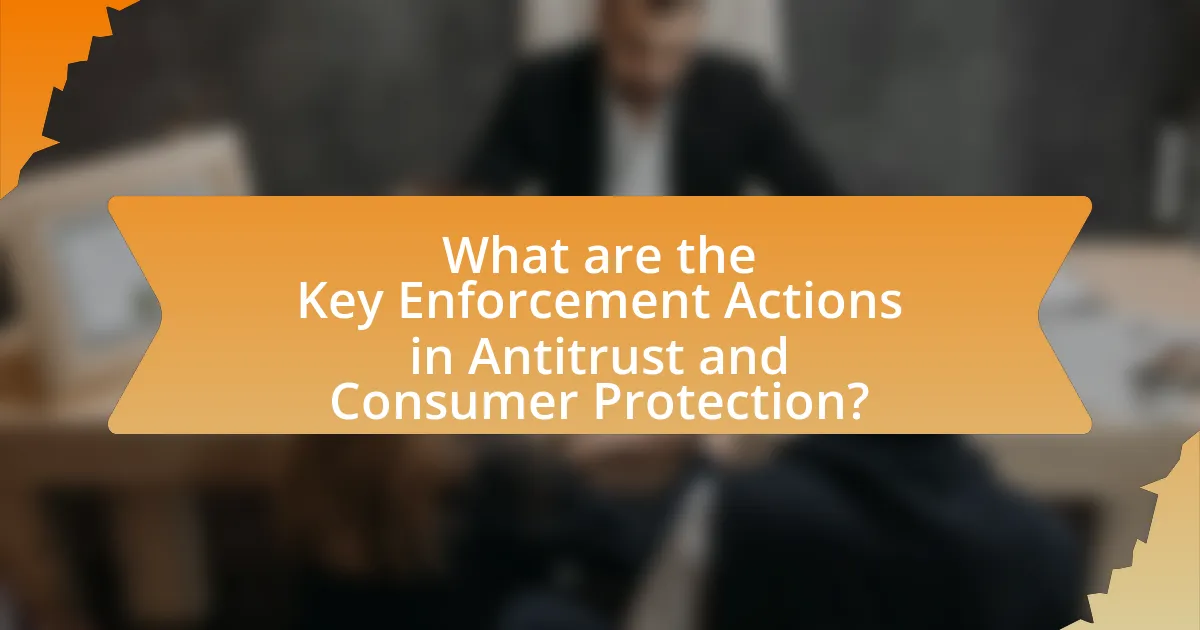
What are the Key Enforcement Actions in Antitrust and Consumer Protection?
Key enforcement actions in antitrust and consumer protection include investigations, litigation, and settlements aimed at preventing anti-competitive practices and protecting consumer rights. Regulatory bodies like the Federal Trade Commission (FTC) and the Department of Justice (DOJ) actively pursue cases against companies engaging in monopolistic behavior, price-fixing, and deceptive advertising. For instance, the FTC’s 2020 lawsuit against Facebook for anti-competitive practices exemplifies a significant enforcement action aimed at maintaining market competition. Additionally, the DOJ’s actions against Google for monopolistic practices in search and advertising further illustrate the enforcement landscape. These actions are crucial for ensuring fair competition and safeguarding consumer interests in the marketplace.
What types of enforcement actions are commonly taken?
Common types of enforcement actions include civil lawsuits, administrative actions, and criminal prosecutions. Civil lawsuits are often initiated by government agencies or private parties to seek remedies for violations of antitrust laws, such as monopolistic practices or price-fixing. Administrative actions involve regulatory agencies imposing penalties or corrective measures against companies that violate consumer protection laws. Criminal prosecutions can occur when violations are severe, leading to fines or imprisonment for individuals involved in fraudulent activities. These enforcement actions are essential for maintaining fair competition and protecting consumer rights.
How do government agencies initiate enforcement actions?
Government agencies initiate enforcement actions by conducting investigations into potential violations of laws and regulations. These investigations often begin with complaints from consumers, whistleblowers, or other entities, which prompt agencies like the Federal Trade Commission or the Department of Justice to gather evidence. For instance, the FTC may issue subpoenas to collect documents and testimonies relevant to the case. Once sufficient evidence is gathered, agencies can file formal complaints or take legal action to address the violations, as seen in numerous antitrust cases where companies have been penalized for anti-competitive practices.
What role do private lawsuits play in enforcement?
Private lawsuits serve as a critical mechanism for enforcing antitrust laws and consumer protection regulations. They empower individuals and businesses to seek redress for violations, thereby complementing government enforcement efforts. For instance, under the Clayton Act, private parties can sue for triple damages if they suffer losses due to antitrust violations, which incentivizes private enforcement and deters anti-competitive behavior. This dual enforcement system enhances accountability and ensures that victims of unlawful practices have a means to pursue justice, thereby reinforcing the overall effectiveness of regulatory frameworks.
What are the outcomes of enforcement actions?
Enforcement actions typically result in penalties, fines, or corrective measures imposed on entities that violate antitrust laws or consumer protection regulations. These outcomes serve to deter future violations, promote compliance, and protect consumer interests. For instance, in 2020, the Federal Trade Commission imposed a $5 billion fine on Facebook for privacy violations, illustrating the significant financial repercussions of enforcement actions. Additionally, enforcement actions may lead to changes in business practices, such as requiring companies to alter their advertising strategies or improve transparency in their operations, thereby enhancing consumer protection.
How do settlements differ from court rulings in these cases?
Settlements differ from court rulings in antitrust and consumer protection cases primarily in their nature and outcomes. Settlements are agreements reached between parties to resolve a dispute without a trial, often involving concessions from both sides, while court rulings are decisions made by a judge or jury after a trial, establishing legal precedents and binding obligations.
In settlements, parties may negotiate terms that include monetary compensation, changes in business practices, or other remedies tailored to their specific situation, allowing for flexibility and quicker resolution. In contrast, court rulings provide a formal legal judgment that can set a precedent for future cases, ensuring uniformity in the application of the law. For example, a court ruling may impose strict penalties or injunctions based on statutory interpretations, whereas a settlement might avoid such harsh outcomes by allowing for negotiated compliance.
What penalties can be imposed on violators?
Violators of antitrust laws can face significant penalties, including substantial fines, which can reach up to $100 million for corporations and $1 million for individuals. Additionally, violators may be subject to imprisonment for up to 10 years. These penalties are enforced to deter anti-competitive practices and protect consumer interests, as established by the Sherman Act and the Clayton Act. The U.S. Department of Justice and the Federal Trade Commission actively pursue enforcement actions to uphold these laws, ensuring compliance and accountability in the marketplace.

How do Enforcement Actions Affect Consumers?
Enforcement actions significantly affect consumers by promoting fair competition and protecting consumer rights. These actions, taken by regulatory bodies against companies that violate antitrust laws or engage in deceptive practices, aim to prevent monopolistic behaviors that can lead to higher prices, reduced choices, and inferior products for consumers. For instance, the Federal Trade Commission (FTC) and the Department of Justice (DOJ) have historically intervened in cases like the Microsoft antitrust case, which resulted in increased competition in the software market, ultimately benefiting consumers through lower prices and improved services. Thus, enforcement actions serve as a crucial mechanism to ensure that consumers are not exploited and that the market remains competitive.
What protections do consumers gain from enforcement actions?
Consumers gain protections from enforcement actions through the prevention of unfair business practices and the promotion of fair competition. Enforcement actions, typically initiated by government agencies, aim to address violations of antitrust laws, which can include price-fixing, monopolistic behavior, and deceptive advertising. These actions help ensure that consumers have access to competitive prices, quality products, and truthful information about goods and services. For instance, the Federal Trade Commission (FTC) has successfully pursued cases against companies that engaged in anti-competitive practices, resulting in lower prices and improved choices for consumers.
How do enforcement actions lead to better market practices?
Enforcement actions lead to better market practices by deterring anti-competitive behavior and promoting compliance with regulations. When regulatory bodies impose penalties or sanctions on companies for violations, it creates a clear incentive for businesses to adhere to fair practices. For instance, the Federal Trade Commission (FTC) reported that enforcement actions against deceptive advertising resulted in a significant reduction in misleading claims in the marketplace, thereby enhancing consumer trust and market integrity. This demonstrates that the threat of enforcement not only corrects specific violations but also fosters a culture of compliance that benefits the overall market environment.
What role do consumers play in the enforcement process?
Consumers play a crucial role in the enforcement process of antitrust law and consumer protection by acting as informants and advocates for fair market practices. Their complaints and reports of unfair practices, such as price-fixing or deceptive advertising, provide essential evidence that can trigger investigations by regulatory bodies like the Federal Trade Commission (FTC) or the Department of Justice (DOJ). For instance, in 2020, the FTC received over 3.3 million consumer complaints, which significantly influenced its enforcement actions against companies engaging in anti-competitive behavior. Thus, consumer participation is vital for identifying violations and ensuring accountability in the marketplace.
What challenges do consumers face in the enforcement landscape?
Consumers face significant challenges in the enforcement landscape, primarily due to limited awareness of their rights and the complexities of legal processes. Many consumers lack understanding of antitrust laws and consumer protection regulations, which hinders their ability to identify violations. Additionally, the enforcement mechanisms often require substantial resources, including time and financial investment, making it difficult for individual consumers to pursue claims against larger corporations. Studies indicate that only a small percentage of consumers report issues, often due to fear of retaliation or skepticism about the effectiveness of enforcement actions. This lack of engagement further weakens the enforcement landscape, as consumer complaints are essential for regulatory bodies to take action.
How can consumers effectively report violations?
Consumers can effectively report violations by documenting the incident thoroughly and submitting their complaint to the appropriate regulatory agency. This process typically involves gathering evidence such as receipts, photographs, or correspondence related to the violation, which strengthens the complaint. For instance, in the United States, consumers can report antitrust violations to the Federal Trade Commission (FTC) or the Department of Justice (DOJ), both of which have established procedures for filing complaints. According to the FTC, providing detailed information about the violation, including the nature of the complaint and any supporting documentation, increases the likelihood of a thorough investigation.
What resources are available for consumers seeking justice?
Consumers seeking justice have access to several resources, including government agencies, legal aid organizations, and consumer advocacy groups. Government agencies such as the Federal Trade Commission (FTC) and state attorneys general enforce consumer protection laws and investigate unfair business practices. Legal aid organizations provide free or low-cost legal assistance to individuals who cannot afford representation, helping them navigate the legal system. Additionally, consumer advocacy groups, like the Consumer Federation of America, offer information, support, and resources to help consumers understand their rights and take action against unfair practices. These resources collectively empower consumers to seek justice effectively.
What best practices should consumers follow regarding Antitrust and Consumer Protection?
Consumers should actively educate themselves about their rights under antitrust laws and consumer protection regulations. Understanding these rights enables consumers to recognize anti-competitive practices, such as price-fixing or monopolistic behavior, which can harm their interests. For instance, the Federal Trade Commission (FTC) provides resources that outline consumer rights and how to report unfair practices. Additionally, consumers should report suspicious activities to relevant authorities, such as the FTC or state attorneys general, as this helps enforce laws designed to protect competition and consumer welfare. Engaging in collective action, such as joining consumer advocacy groups, can also amplify their voices against unfair practices.
